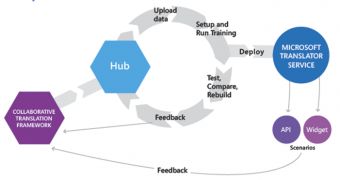On July 11th, during the Microsoft Worldwide Partner Conference, the Redmond-based software giant announced the commercial availability of a new tool aimed at making communication among people easier than before, namely the Microsoft Translator Hub.
The new tool has been designed so as to provide businesses with the possibility to easily build, train, and deploy both personalized and new automatic language-translation systems.
Moreover, the new Translator Hub, which is built with significant help coming from Microsoft Research, is expected to provide support for use in specialized domains that require unique, specific terminology, including health care, the legal profession, or technology.
Vikram Dendi, director, product management, Microsoft/Bing Translator, explains that Microsoft Translator Hub is “an innovative tool that gives partners and communities unprecedented control over how the translation engine translates their content -- before the translations are delivered.”
“Using the Hub, users can improve and optimize the translation quality for a specific area of terminology and style,” Dendi continues.
The new Translator Hub comes as a free extension for the Microsoft Translator service, enabling companies to take advantage of Microsoft Translator’s big data backend and to combine it with existing translated documents.
Thus, they could easily come up with custom translation systems, accessible via standard Microsoft Translator API, and which can be built into any scenario or workflow.
“While the technology behind the translation and customization services is very powerful, our goal was to deliver the Hub as a simple to use private web portal that makes it easy for users to get started quickly,” Dendi notes.
He also explains that users will be able to come up with custom machine translation systems in four simple steps.
Those who use the Hub will be able to upload parallel (same document in two languages) and monolingual (single language) documents in more than one format.
Moreover, they will be able to build custom translation models in private workspace that can benefit from Microsoft Translator’s machine learning based training systems.
“The Hub provides methods and a simple user interface for collaborating and improving the translation system with reviewers, before deploying to the Microsoft Translator runtime infrastructure. The owner of the customized system can keep the system private, share it with other individuals, companies, or make it available publicly,” Dendi explains.
Additional info on the tool can be found on the Microsoft Translator website. Users can also request invitations to the Hub straight from the Translator Hub portal.

 14 DAY TRIAL //
14 DAY TRIAL //